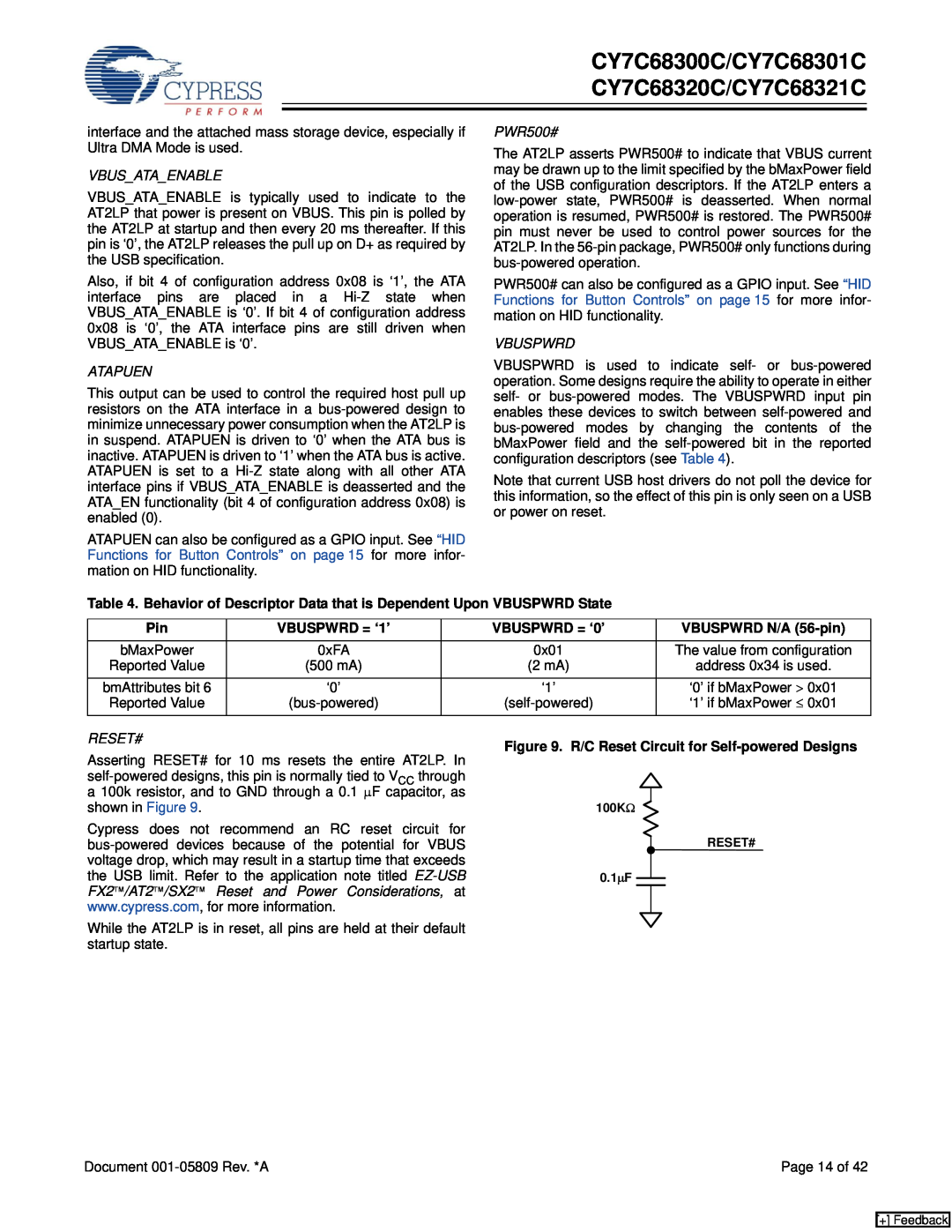CY7C68300C/CY7C68301C CY7C68320C/CY7C68321C
Features
Block Diagram
EZ-USB AT2LP USB 2.0 to ATA/ATAPI Bridge
Introduction
Applications
CY7C68300A Compatibility
CY4615C EZ-USB AT2LP Reference Design Kit USB Specification version
CY7C68301C
EZ-USB AT2LP
CY7C68300C
56-pin SSOP
RESET#
EZ-USB AT2LP CY7C68300C CY7C68301C 56-pin QFN
ENABLE
DD13
CY7C68321C
EZ-USB AT2LP
CY7C68320C
56-pin SSOP
GPIO2
EZ-USB AT2LP CY7C68320C CY7C68321C 56-pin QFN
ARESET#
DD15
CY7C68321A
100-pin TQFP
CY7C68320A
page
USB D+ signal See “DPLUS, DMINUS” on page
USB D-signal See “DPLUS, DMINUS” on page
PU 10K
CY7C68300C/CY7C68301C
CY7C68320C/CY7C68321C
Chip reset See “RESET#” on page
VBUS detection See “VBUSATAENABLE” on
SCL, SDA
“ATAPUEN” on page
DPLUS, DMINUS
XTALIN, XTALOUT
SYSIRQ
USB High-Speed
DRVPWRVLD
GPIO Pins
ATA Interface Pins
LOWPWR#
ATAPUEN
VBUSATAENABLE
RESET#
PWR500#
ATA Command Block ATACB
HID Functions for Button Controls
Functional Overview
Field Name
Table 6. ATACB Field Descriptions
Byte
Field Description
5-12
Figure 10. Operational Mode Selection Flow
Operating Modes
Operational Mode Selection Flow
Fused Memory Data
Bulk-Only Transport Specification . There is a vendor-specific
Table 7. Command Block Wrapper
Normal Mass Storage Mode
MfgCB
EEPROM Organization
Figure 11. Snapshot of ‘AT2LP Blaster’ Utility
“Functional Overview” on page 15 for more detail on how
Enable a delay of up to 120 ms at each read of the DRQ bit
where the device data length does not match the host data
length. This allows the CY7C68300C/CY7C68301C to work
Determines if the AT2LP is to do an SRST reset during drive
returned on bits 2, 1, and 0 of EP1IN. This bit must be set to
CY7C68300C/CY7C68301C CY7C68320C/CY7C68321C
Configuration
does not exist. The USB Mass Storage Class Bulk-Only
USB Bulk In Endpoint
Interface Descriptor
USB Bulk Out Endpoint
Terminator
Number of the channel, must be a zero based value that is
Page 29 of
Descriptor-Index 0 LANGID
CY7C68300C/CY7C68301C CY7C68320C/CY7C68321C
Descriptor-Serial Number
unique serial
LOADCONFIGDATA
Label
Table 12.EEPROM-related Vendor-specific Commands
READCONFIGDATA
bmRequestType
Operating Conditions
DC Characteristics
Absolute Maximum Ratings
ATA Timing Characteristics
AC Electrical Characteristics
Ordering Information
USB Transceiver Characteristics
Package Diagrams
Figure 12. 100-Pin Thin Plastic Quad Flatpack 14 x 20 x 1.4 mm A101
Package Diagrams continued
Figure 13. 56-lead Shrunk Small Outline Package
Page 39 of
General PCB Layout Recommendations For USB Mass Storage Designs
Figure 14. 56-Lead QFN 8 x 8 mm LF56A
PCB Material
Quad Flat Package No Leads QFN Package Design Notes
Other Design Considerations
Devices With Small Buffers
Disclaimers, Trademarks, and Copyrights
IDE Removable Media Devices
Document Number
Document History Paged
Issue Date
ECN NO
